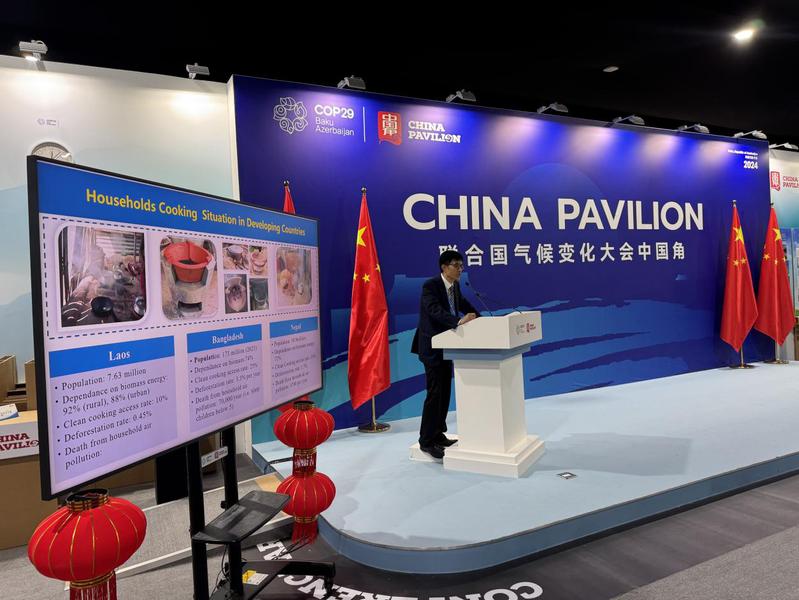On November 15, 2024, the South-South Cooperation High-Level Forum on Climate Change was held at the 29th Conference of the Parties (COP29) to the United Nations Framework Convention on Climate Change (UNFCCC) in Baku, Azerbaijan. This forum, hosted by the Chinese Pavilion at COP29, invited ministers and high-level representatives from relevant countries, international organizations, and senior experts in the field to discuss ways to enhance climate action among South-South countries, deepen South-South cooperation on climate change under the Belt and Road Initiative, and work together to promote a green and low-carbon modernization process. This forum was the twelfth high-level forum on South-South cooperation on climate change organized by the Chinese delegation since 2011.
The opening ceremony of the forum was chaired by Zhao Yingmin, Head of the Chinese Climate Negotiation Delegation and Vice Minister of the Ministry of Ecology and Environment (MEE) of China. Attendees included Huang Runqiu, Minister of the Ministry of Ecology and Environment of China, Jorge Morella da Silva, UN Deputy Secretary-General, Simon Stiell, Executive Secretary of the UNFCCC Secretariat, Elnur Soltadze, CEO of COP29, Liu Hua, Deputy Director-General of the International Atomic Energy Agency, Katie Vande Heiden, Deputy Executive Director of UNICEF, Dima Khatib, Director of the UN Office for South-South Cooperation, and senior officials from relevant ministries and departments of countries such as Nigeria, Seychelles, Chad, Brazil, Laos, Uganda, and Antigua and Barbuda.
Professor Liu Guangqing, Executive Director of the Belt and Road Global Cooperation Research Institute, Director of the Biomass Energy and Environmental Engineering Research Center, and Chairman of the Civilian Clean Stove Committee of the China Rural Energy Industry Association, was invited to attend the forum and deliver a keynote speech. The forum focused on three main topics: (1) the African Solar Belt project and its role in promoting low-carbon energy transition, (2) practical cooperation on clean stoves to support sustainable development, and (3) zero-carbon island cooperation as a model for global climate governance.
Chen Zhihua, Deputy Director of the National Center for Climate Change Strategy and International Cooperation (NCSC), chaired the session on Practical Cooperation on Clean Stoves to Achieve Sustainable Development, highlighting the significance of South-South cooperation on clean stoves in the context of climate change and proposing future project ideas and recommendations.
In his keynote speech titled Clean Fuels and Stoves for South-South Climate Change Cooperation, Professor Liu Guangqing analyzed the current status of clean cooking in developing countries and the social, environmental, and health issues caused by inefficient traditional stoves. He shared China's technological innovations, product advantages, and industrial development experience in clean stoves and molded fuels, and provided recommendations for future South-South cooperation projects on clean stoves.
Other notable speakers included Liu Hongpeng, Director of the Energy Division of the UN Economic and Social Commission for Asia and the Pacific (ESCAP), Balladevi Kumarmuru, Executive Director of the World Bioenergy Association, Naresh Sharma, Deputy Secretary-General of the Climate Change Division of the Nepal Ministry of Forests and Environment, and Jiang Hao, Expert on Environment and Climate Issues at the UN Industrial Development Organization’s Investment and Technology Promotion Office. These experts discussed the significance of promoting clean stoves, shared their experiences and models, and offered development suggestions.
During the forum, Liu Guangqing engaged in in-depth discussions with relevant officials from Uganda, Tanzania, Zambia, Nigeria, Nepal, and other countries responsible for clean fuels and stoves. He also interacted with representatives from international organizations such as the UNIDO, ESCAP, and the World Bioenergy Association, exchanging experiences, models, and cooperation plans for South-South cooperation on clean stoves. These discussions provided valuable support for the implementation of South-South cooperation projects on clean stoves in China.

